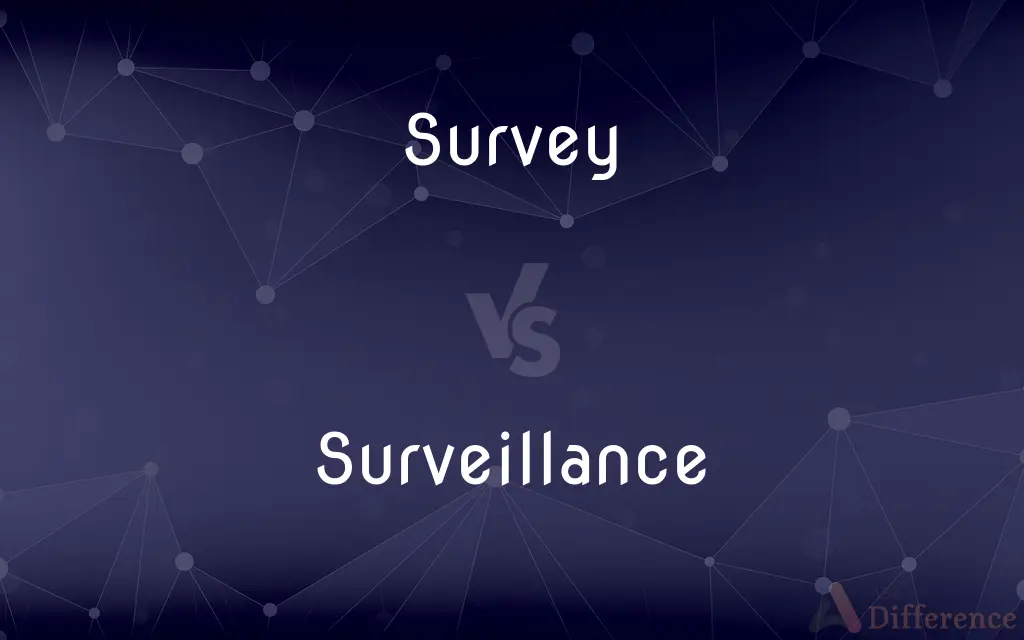Survey vs. Surveillance — What's the Difference?
By Tayyaba Rehman — Updated on November 6, 2023
A survey is a systematic collection of data from a sample population, whereas surveillance is the continuous monitoring of activities or changes in conditions.

Difference Between Survey and Surveillance
Table of Contents
ADVERTISEMENT
Key Differences
A survey is a method of gathering information by asking a series of questions to a group of individuals. This process is typically used in research, marketing, and social studies to gather statistical data or insights on opinions, behaviors, or experiences. Surveys can be conducted via various mediums such as online questionnaires, telephone interviews, or paper forms.
Surveillance, on the other hand, refers to the ongoing observation or tracking of a person, group, or area, often for the purpose of oversight, security, or data collection. Surveillance can be done using electronic equipment, such as cameras and tracking devices, or through direct observation by individuals such as security personnel or law enforcement.
In a survey, the participants are aware that they are providing information and typically consent to be part of the survey. The questions are designed to be answered once, or periodically at specific intervals. The intent is to collect data for analysis to identify trends, preferences, or patterns among a certain demographic.
Conversely, surveillance is generally carried out without the explicit consent of those being observed. It is continuous or occurs over an extended period, aimed at watching or tracking behavior without direct interaction. Surveillance is often associated with security measures, privacy concerns, and sometimes with ethical and legal debates.
While both surveys and surveillance gather information, the methods, purposes, and ethical considerations involved are distinctly different. Surveys are a tool primarily for research and decision-making, relying on voluntary responses, whereas surveillance is about oversight and often involves involuntary observation.
ADVERTISEMENT
Comparison Chart
Purpose
Collect data for analysis.
Monitor or track behavior.
Consent
Participants usually consent.
Often conducted without consent.
Method
Questionnaires or interviews.
Use of tracking devices or cameras.
Frequency
Once or at intervals.
Continuous or over a period.
Primary Fields
Research, marketing.
Security, law enforcement.
Compare with Definitions
Survey
An assessment of opinions or experiences
A health survey was distributed to understand the impact of the new policy.
Surveillance
Continuous observation of a place or people
The bank installed new cameras for better surveillance.
Survey
To look over the parts, features, or contents of; view broadly
Surveyed the neighborhood from a rooftop.
Surveyed the shelves in the pantry.
Surveillance
Close watch kept on someone suspected
The suspects were put under surveillance by the police.
Survey
To look at or examine carefully and appraise
Surveyed the storm damage. ].
Surveillance
The act of watching over a subject
The detective was under surveillance during the investigation.
Survey
The act of surveying; a general view.
Surveillance
Use of technology to track movements
Drone surveillance was used to monitor the festival.
Survey
A particular view; an examination, especially an official examination, of a particular group of items, in order to ascertain the condition, quantity, or quality.
A survey of the stores of a ship; a survey of roads and bridges; a survey of buildings.
Surveillance
Surveillance is the monitoring of behavior, many activities, or information for the purpose of information gathering, influencing, managing or directing. This can include observation from a distance by means of electronic equipment, such as closed-circuit television (CCTV), or interception of electronically transmitted information like Internet traffic.
Survey
The operation of finding the contour, dimensions, position, or other particulars of any part of the Earth's surface.
Surveillance
Close observation of a person or group, especially one under suspicion.
Survey
A measured plan and description of any portion of country.
The owners of the adjoining plots had conflicting surveys.
Surveillance
The act of observing or the condition of being observed.
Survey
An examination of the opinions of a group of people.
The local council conducted a survey of its residents to help it decide whether to go ahead with the roadside waste collection service.
Surveillance
Close observation of an individual or group; person or persons under suspicion.
Survey
A questionnaire or similar instrument used for examining the opinions of a group of people.
I just filled out that survey on roadside waste pick-up.
Surveillance
Continuous monitoring of disease occurrence for example.
Survey
(historical) An auction at which a farm is let for a lease for lives.
Surveillance
Systematic observation of places and people by visual, aural, electronic, photographic or other means.
Survey
(US) A district for the collection of customs under a particular officer.
Surveillance
(legal) In criminal law, an investigation process by which police gather evidence about crimes, or suspected crime, through continued observation of persons or places.
Survey
To inspect, or take a view of; to view with attention, as from a high place; to overlook
He stood on a hill, and surveyed the surrounding country.
Surveillance
Oversight; watch; inspection; supervision.
That sort of surveillance of which . . . the young have accused the old.
Survey
To view with a scrutinizing eye; to examine.
Surveillance
Close observation of a person or group (usually by the police)
Survey
To examine with reference to condition, situation, value, etc.; to examine and ascertain the state of
It was his job to survey buildings in order to determine their value and risks.
Surveillance
Monitoring of behavior for security
Surveillance in the mall helped reduce thefts.
Survey
To determine the form, extent, position, etc., of, as a tract of land, a coast, harbor, or the like, by means of linear and angular measurements, and the application of the principles of geometry and trigonometry
To survey land or a coast
Survey
To examine and ascertain, as the boundaries and royalties of a manor, the tenure of the tenants, and the rent and value of the same.
Survey
To investigate the opinions, experiences, etc., of people by asking them questions; to conduct a survey; to administer a questionnaire.
Survey
To inspect, or take a view of; to view with attention, as from a high place; to overlook; as, to stand on a hill, and survey the surrounding country.
Round he surveys and well might, where he stood,So high above.
Survey
To view with a scrutinizing eye; to examine.
With such altered looks, . . . All pale and speechless, he surveyed me round.
Survey
To examine with reference to condition, situation, value, etc.; to examine and ascertain the state of; as, to survey a building in order to determine its value and exposure to loss by fire.
Survey
To determine the form, extent, position, etc., of, as a tract of land, a coast, harbor, or the like, by means of linear and angular measurments, and the application of the principles of geometry and trigonometry; as, to survey land or a coast.
Survey
To examine and ascertain, as the boundaries and royalties of a manor, the tenure of the tenants, and the rent and value of the same.
Survey
The act of surveying; a general view, as from above.
Under his proud survey the city lies.
Survey
A particular view; an examination, especially an official examination, of all the parts or particulars of a thing, with a design to ascertain the condition, quantity, or quality; as, a survey of the stores of a ship; a survey of roads and bridges; a survey of buildings.
Survey
The operation of finding the contour, dimensions, position, or other particulars of, as any part of the earth's surface, whether land or water; also, a measured plan and description of any portion of country, or of a road or line through it.
Survey
A detailed critical inspection
Survey
Short descriptive summary (of events)
Survey
The act of looking or seeing or observing;
He tried to get a better view of it
His survey of the battlefield was limited
Survey
Consider in a comprehensive way;
He appraised the situation carefully before acting
Survey
Look over in a comprehensively, inspect;
He surveyed his new classmates
Survey
Keep under surveillance;
The police had been following him for weeks but they could not prove his involvement in the bombing
Survey
Hold a review (of troops)
Survey
Make a survey of; for statistical purposes
Survey
Plot a map of (land)
Survey
A research tool for collecting data
The company conducted a customer satisfaction survey.
Survey
A detailed inspection of land
The engineer carried out a land survey before construction.
Survey
A general view or examination
She took a survey of the room before setting up her presentation.
Survey
A method of public opinion polling
The political survey showed a shift in voter attitudes.
Common Curiosities
Are surveys only used for market research?
No, surveys are used in various fields including social sciences, health, and education.
Do surveys always have questions?
Typically, yes, surveys consist of a series of questions to gather information.
Can surveys be anonymous?
Yes, surveys can be designed to protect respondents' anonymity.
Is surveillance legal?
Surveillance is legal within certain parameters set by laws and regulations.
Can surveillance be done without technology?
Yes, surveillance can involve simple observation without technological tools.
Is all surveillance constant?
No, some surveillance is intermittent, depending on the context.
Are people always aware they're under surveillance?
Not always, sometimes surveillance is covert.
What is the purpose of surveillance?
It's primarily for security, safety, and tracking purposes.
Do surveys collect qualitative data?
Surveys can collect both qualitative and quantitative data.
What makes a survey reliable?
Good survey design, representative sampling, and consistent methodology contribute to reliability.
Can surveys influence policy-making?
Yes, survey results can inform policy decisions by providing relevant data.
How are survey results used?
They're used to make informed decisions, understand trends, and form strategies.
Can survey participation be mandatory?
In some cases, such as certain official censuses, it can be.
Do surveillance cameras prevent crime?
They can act as a deterrent and are useful for evidence collection.
What's the difference between surveillance cameras and CCTV?
CCTV refers to closed-circuit television, which is a type of surveillance system.
Share Your Discovery

Previous Comparison
Pining vs. Pinning
Next Comparison
Hemidesmosome vs. DesmosomeAuthor Spotlight
Written by
Tayyaba RehmanTayyaba Rehman is a distinguished writer, currently serving as a primary contributor to askdifference.com. As a researcher in semantics and etymology, Tayyaba's passion for the complexity of languages and their distinctions has found a perfect home on the platform. Tayyaba delves into the intricacies of language, distinguishing between commonly confused words and phrases, thereby providing clarity for readers worldwide.














































